| Article ID | Journal | Published Year | Pages | File Type |
|---|---|---|---|---|
| 6840854 | Economics of Education Review | 2015 | 20 Pages |
Abstract
This study considers the impact of state-level guaranteed tuition programs on postsecondary tuition levels. The analytic framework argues that state-level laws requiring flat tuition rates for four years contain inflationary risk, which encourages institutions to set tuition higher than they otherwise would with annual adjustments. To empirically test this idea, this study uses a national panel dataset and a quasi-experimental difference-in-difference methodological approach, with Illinois' Truth-in-Tuition law serving as the treatment condition. On average, institutions subject to this law increased annual tuition by approximately 26-30% and aggregate four-year tuition by approximately 6-7% in excess of the amount predicted by the trend for institutions not subject to the law. These findings are robust to multiple alternative specifications and support the idea that state-level guaranteed tuition programs encourage large institutional tuition increases. Implications of these findings for state policymakers, higher education institutional leaders, and college-age students and their families are also discussed.
Related Topics
Social Sciences and Humanities
Economics, Econometrics and Finance
Economics and Econometrics
Authors
Jennifer A. Delaney, Tyler D. Kearney,
